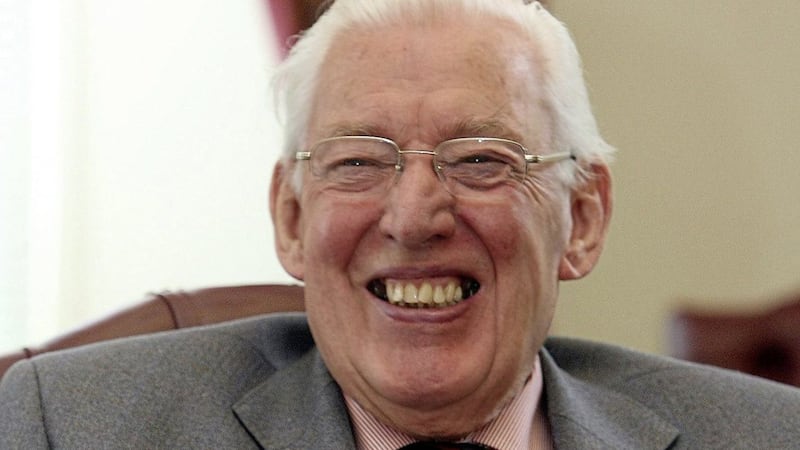The exhibition that opened in the Ulster Museum last weekend meant to show the daftness of stereotypes features the ‘Derry Girls’ blackboard of ‘differences’.
So Protestants love flutes. Also soup, brooches, gardening. That Catholics like or love incense and Bingo seems less funny to me, but that could be me.
Maybe without responding to the poll/questionnaire, the exhibition is worth a visit. A frail Alice Milligan painted in dark colours is labelled ‘Protestant but nationalist’. A hot pink badge says ‘Saved Sodomy from Ulster’ close to an altered image of the Reverend Ian Paisley in his prime, booming ‘The Ayatollah is watching YOU – Gays now, YOU next.’
And I’m turning away, remembering how unfunny his, and Peter Robinson’s, Sodomy crusade was, when a face from the past says hello. Out with the grandchildren on Saturday afternoon, good humoured as ever in spite of views that would curdle milk. (Revered Paisley, then was revolted by the power-sharing with Martin McGuinness, Sinn Féin/IRA. Last hope now is Jim Allister.)
The poll/questionnaire is a ‘just a bit of a laugh’. In deference to the fidgety grandchildren we shake hands and move on. Then I open the Irish News and up pops Paisley again.
‘At this point in the trial the courtroom was rocked by a very loud explosion which seemed to come from the rear of the press box.’ What point of what trial? The court report reprinted in Saturday’s ‘On this Day’ recorded the blast directly after ‘As Reverend Paisley was leaving the room, he bent down and whispered in the witness’s ear: “Did you talk?”’
No good scriptwriter would write that as a sequence. As if the Reverend Paisley asking a sinister question was not enough. But this was February 21 1970, five men on trial for conspiring to bomb the water pipeline at Dunadry, largely on the word of an alleged co-conspirator given a twelve year sentence after confessing.
In the words of Paisley expert Ed Moloney, self-proclaimed UVF chief of staff Samuel Stevenson was ‘the first supergrass’. The defendants’ counsel had fun with his criminal record and the jury did the rest. The five acquitted men were carried out of court shoulder-high by a cheering crowd.
In Stevenson’s testimony ‘the room’ the Reverend was leaving was the police station cell where Stevenson was being held for questioning about bombings at electricity and water facilities.
Which, it emerged, were meant to cast blame on the (emerging) IRA and to finger unionist prime minister Terence O’Neill for encouraging republican bombers (supposedly by his ‘concessions’ to civil righters) and so force him out of office. Which they did.
More small bombs in 1970 were also meant to push the Stormont government to let Paisley out of jail. He walked free eight days after O’Neill’s resignation when O’Neill’s successor delivered an amnesty. Paisley, man of God, who visited Stevenson’s cell (pre-jail) as his pastor, never faced police questioning in spite of multiple links to those accused.
Historian Eamon Phoenix who curates ‘On This Day’ gives as much context as possible but early 1970 was helter-skelter into the Troubles. For lucid accounts of a crammed and crucial period try ‘Paisley’ by Ed Moloney, updated from his earlier version with Andy Pollak, and ‘Making Sense of the Troubles’ by Davids McKittrick and McVea. (Declaration of interest: three of the writers were colleagues and I’m married to the fourth. But the books are unbeaten.)
The first IRA bombs came later in 1970. The baleful influence of Paisley, unionist opposition to civil rights, Catholic mistrust of the RUC, these were all factors as the place went to hell in a handcart. Phoenix’s On This Day alternates Irish News reports from 1970 and 1920. The settlement of 1920 ensured unionist one-party rule and the exclusion of nationalists from power. Official Britain shucked off responsibility. Half a century later the whirlwind arrived.
Decision-makers in London and Dublin don’t know the half of it.








